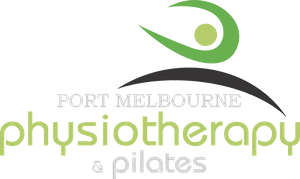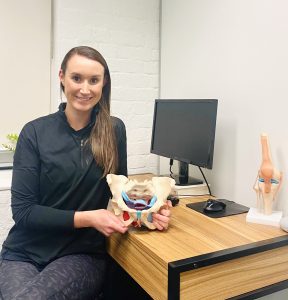Pelvic Floor Physiotherapy
At Port Melbourne Physiotherapy and Pilates we have four qualified Pelvic Floor Physiotherapists.
Julia Raptis (Esposito), Alexandra Walker, Ali Minichiello and Emily Tregear are all qualified Pelvic Health Physiotherapists. Julia and Alex completed their post-graduate training in Pelvic Floor and Continence Physiotherapy at The University of Melbourne. Ali and Emily completed their training through Pelvic Health Melbourne. Julia and Alex treat both female and male pelvic health patients and Ali and Emily treat female pelvic health patients only.
These Physiotherapists are qualified to treat the conditions listed below.
- Weak or overactive pelvic floor muscles
- Stress urinary incontinence (e.g. I leak when I sneeze)
- Urgency urinary incontinence (e.g. I cannot hold on as long as I used to be able to)
- Pelvic floor training in pregnancy to prevent incontinence during and after pregnancy
- Postpartum pelvic floor check ups
- Return to running and sport/exercise postpartum
- Childbirth injuries and perineal trauma (tears, episiotomies)
- Pelvic organ prolapse
- Constipation and defecation disorders
- Overactive bladder
- Chronic pelvic pain
- Incontinence and pelvic floor related issues in athletes
- Pain with intimacy (Dyspareunia)
- Vulvodynia
- Vaginismus
- Pain related to endometriosis, adenomyosis or polycystic ovarian syndrome (PCOS)
- Menopause issues
- Pre and post hysterectomy and gynaecological surgery
In addition to the conditions/issues above, Julia and Alex can also treat the following:
- Coccydynia
- Pre/post prostate removal surgery (prostatectomy)
- Prostatitis pelvic floor related issues
- Male incontinence issues
- Nocturnal enuresis (bed wetting)

There is fantastic evidence to support individualised pelvic floor muscle training (PFMT) can prevent and improve pelvic floor dysfunctions. Additionally, evidence has shown that a strong pelvic floor can assist vaginal deliveries and potentially shorten labor duration which therefore, can prevent postnatal incontinence and pelvic floor dysfunction.
Additionally, even if you are not experiencing any pelvic floor or continence issues, there is also a large amount of evidence that supports pelvic floor muscle training to prevent pelvic floor and continence dysfunction.
What will a Pelvic Physio Initial Appointment Include?
The gold standard of assessing the strength of your pelvic floor muscles and the pelvic connective tissue integrity is with an internal examination. However, if you would prefer to not do an internal examination, our Physiotherapists will use non-invasive, external assessment techniques.
One of these external techniques may include using the Real Time Ultrasound machine. In which case we ask that you empty your bladder 2hrs before your appointment. You should then consume 500-700ml (2-3 glasses) of water, stopping 30 minutes before appointment, then don’t empty your bladder. If you find if challenging to hold this amount of water in your bladder, that is okay, our Physiotherapists can work around this.
* Please note that Julia is currently on maternity leave *


